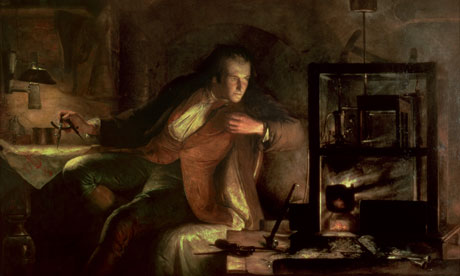
At the heart of Glasgow Green, the city's oldest park, there is a 140ft obelisk dedicated to Horatio Nelson. Built in 1806, a year after the great man's death, the monument was the first major civic commemoration to be erected after his victory at Trafalgar and predates the construction of Nelson's Column in London by more than 30 years.
Much later, in the 1980s, Glasgow's councillors decided to place a second memorial near the column, a small boulder with a simple inscription. "Near this spot in 1765, James Watt conceived the idea for the separate condenser for the steam engine."
The contrast is intriguing. On the one hand, a remote battle was celebrated immediately with a grandiose stonework. On the other, an invention that gave birth to the industrial revolution had to wait almost two centuries for recognition – in the form of a small plinth. Nelson may have saved Britain from French invasion but Watt transformed an entire planet when he took a Sunday morning stroll across the green and thought of the idea of the secondary condenser.
Within a few decades of Watt's breakthrough, webs of railways, factories and mines were spreading across the nation, triggering a global frenzy for fossil-fuel burning that is now propelling the world towards dangerous climate change. Indeed, the Nobel prize-winning chemist Paul Crutzen now argues that greenhouse gases have brought about such profound changes that we must accept the world has entered a new epoch: the anthropocene, he calls it. As to this new epoch's birthplace, Crutzen believes it can be placed precisely to Watt's stroll.
Now I have to confess to a particular fascination with this idea, which pinpoints the birth of a world-changing event with such specificity, partly because of its importance – and partly because my early childhood home, a tenement flat on Glasgow's London Road, overlooked the parkland where Watt strolled as he worked out his great idea. It is reassuring to realise that you have been raised in a neighbourhood that was epoch-making.
William Rosen, I am pleased to say, shares my enthusiasm for Watt's inspiration. As he states in this intriguing, witty account of the birth of steam power, the inventor's walk on Glasgow Green was "one of the best recorded, and most repeated, eureka moments since Archimedes leaped out of his bathtub." However, we should note, precisely, what Watt achieved on that stroll. He certainly did not invent the steam engine. That had already been done. Nor, adds Rosen, should we take seriously those stories of the great inventor's childhood fascination with steam pushing aside kettle lids.
In fact, Watt was less interested in the power of steam to push than he was in its ability to create a vacuum that could pull. In 1765, he was working on a Newcomen pump, a state-of-the-art engine in which steam pushed a piston through a cylinder. Water was then sprayed into the cylinder, causing the steam to condense, creating a vacuum behind the piston which was sucked back to its original position. More steam was pumped in, and the piston was pushed forward again.
However, constantly heating and then cooling the engine's huge cylinder was incredibly inefficient. Up to three-quarters of the engine's steam was wasted this way, Watt calculated. He dreamed up all sorts of solutions, none of them feasible, until his epiphany on Glasgow Green. A separate condenser would create a vacuum but allow the engine's cylinder to operate at a constant temperature, he realised. Steam power was transformed.
It took a remarkable confluence of ideas to prepare the ground for the breakthrough, however. These included: changes to British patent laws which provided effective protection for those who came up with money-earning ideas; philosopher John Locke's arguments that man has rights to property where labour had been added; pioneering work on early steam engines by Savery, Newcomen and Papin; the discovery of latent heat by Watt's Glasgow University friend Joseph Black; and the ability to make industrial devices of real precision.
These advances, which Rosen laces into his account with skill, answer a key question raised in his prologue: "If the process of thinking up 'gadgets' was, at bottom, the same for Archimedes, Leonardo da Vinci and James Watt, why did it take until the middle of the 18th century for a trickle [of inventions] to become a wave?" Three hundred pages later we get the answer: the ground had been fertilised by political, philosophical and intellectual changes that, for the first time, rewarded both the inventor and society for making and accepting change. Watt didn't know it when he walked out for that walk on Glasgow Green, but his path had already been well prepared.
Robin McKie is the Observer's science editor.

